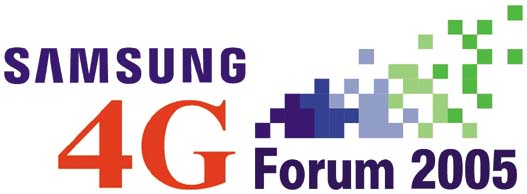Samsung Demonstrates
WiBro Hand-over Technology
To export experiment equipment for WiBro to BT next month
 Samsung Electronics has demonstrated Wireless Broadband (WiBro) Hand-over technology at the 3rd Samsung 4G Forum 2005 held in Jeju Aug. 29-30. Wireless Broadband (WiBro), a home-grown Korean standard closely related to the mobile WiMAX technology (IEEE 802.16e standard), is a wireless high-speed data communications service that is operational at speeds of up to 120 km per hour.
Samsung Electronics has demonstrated Wireless Broadband (WiBro) Hand-over technology at the 3rd Samsung 4G Forum 2005 held in Jeju Aug. 29-30. Wireless Broadband (WiBro), a home-grown Korean standard closely related to the mobile WiMAX technology (IEEE 802.16e standard), is a wireless high-speed data communications service that is operational at speeds of up to 120 km per hour.
Hand-over technology is essential to the true mobile connectivity of the WiBro service. The technology allows devices to be connected seamlessly to internet servers or other networked devices while commuting or moving. This is a significant breakthrough given that the hand-over technology is one of the most difficult and critical technologies to develop and commercialize.
Samsung is the first company in the world to demonstrate hand-over technology that is based on the WiMAX IEEE 802.16e standard. Industry representatives attending the Samsung 4G Forum 2005 experienced the company's WiBro hand-over technology through a live demonstration. True mobile connectivity was shown on a WiBro equipped bus that raveled at speeds of up to 60 km/h.
A live broadcast feed of the Forum was displayed in the media center through WiBro technology, allowing the attending media to experience first-hand the stability and speed of WiBro connectivity.
If the pilot equipment contributed to making an experimental service a success, they said, Samsung will likely supply full-fledged WiBro equipment in a stable manner.
Lee Ki -tae, president of Samsung's telecom-munication network, expects Samsung to hasten the commercial use of the WiBro (Mobile WiMAX) technology. "This forum is very meaningful in that Samsung is the first in the industry to demonstrate the WiBro technology to industry experts and service operators. Samsung is an early adopter of the WiBro technology and we are proud to be presenting the results of our development through live demonstrations of this technology,"he stated.
Lee forecast that an era will be dawning in which all electric appliances are mani-pulated by cellular phones and information from other people miles away will be possible. He noted that Korea has to become an IT powerhouse in terms of mobile communications as it did in broadband Internet services.
About 140 high-profile industry representatives from 24 countries, include those from NTT, BT and KDDI, met to discuss the key technologies for the fourth generation mobile communications during Samsung's 4G Forum. The forum is growing in terms of scale and importance. The members of the forum believe working together can accelerate the availability of solutions and make the key issues that need to be addressed and be understandable.
This year's theme of the forum was "Revolution of Radio Access & Key Technologies for 4G,"giving members two full days of intense briefings on virtually every aspect of planning, deploying and managing the 4G technology.
Mobile telecommunication services are now transitioning from 3rd-generation WCDMA (wide-cdma) to HSDPA (High Speed Downlink Packet Service) and WiBro, 3.5-G services. If 4-G services are put into practice, mobile communication services will evolve into those with speeds 50 times as fast as currently to the extent that people can exchange high-capacity files, including all music and films, in a few minutes, while on the move.
 President Lee said his company is moving beyond the sixth ridge toward the summit (commercializing of 4G services), and Samsung is expected to realize seamlessly WiBro services, considered to be a bridge to 4G technology.
President Lee said his company is moving beyond the sixth ridge toward the summit (commercializing of 4G services), and Samsung is expected to realize seamlessly WiBro services, considered to be a bridge to 4G technology.
In a related development, Samsung Electronics Vice Chairman Yoon Jong-yong said Aug. 29 Samsung Electronics agreed to supply the pilot system for mobile WiMAX and Internet Protocol Multimedia Subsystem (IMS), a Next-Generation Network (NGN), to BT next month. Even though it is a pilot system, it will be the first time that the soon-to-be overseas shipment of the WiBro equipment will be made. It will help Samsung Electronics preoccupy the global market for new systems, which are likely to serve as an emerging next-generation mobile technology, industry analysts said.
Samsung Electronics has made strenuous efforts for the supply of the WiBro equipment to BT since the early 2005, and recently finished negotiations on the deal with BT, sources familiar with the negotiations said.
The 4G mobile communications format is expected to become commercially available around 2010. In preparation, Samsung holds more than 220 patents related to 4G mobile communications. It also has 18 of its members on executive committees at several different industry organizations related to 3rd and 4th generation mobile communications, including 3GPP and WWRF.
About Korea's
WiBro Technology
Wireless Broadband (WiBro) is a service that provides high-speed data communications in a mobile environment, anytime anywhere. WiBro is based on Mobile WiMAX technology developed by Korea's Electronics and Telecom-munications Research Institute (ETRI) and industry players. In February 2002, the Korea government allocated 100 MHZ of frequency spectrum in the 2.3GHz bandwidth. In June 2004, Phase 1 of the WiBro became standardized.
WiBro offers an aggregate data throughput of 20 to 30 Mbps and the base station of the WiBro network covers a radius of 1 km~5 km. Samsung and Korea Telecom plan to show the fully-expanded coverage of the WiBro service at the APEC 2005 Korea Meeting in Busan.
nw
Lee Ki -tae, president of Samsung's telecommunication network, test-operates Wireless Broadband (WiBro) Hand-over technology during a recent demonstration in Jeju as Lim Chu-hwan, president of Electronics and Telecommunications Institute, looks on.
3Fl, 292-47, Shindang 6-dong, Chung-gu, Seoul, Korea 100-456
Tel : 82-2-2235-6114 / Fax : 82-2-2235-0799